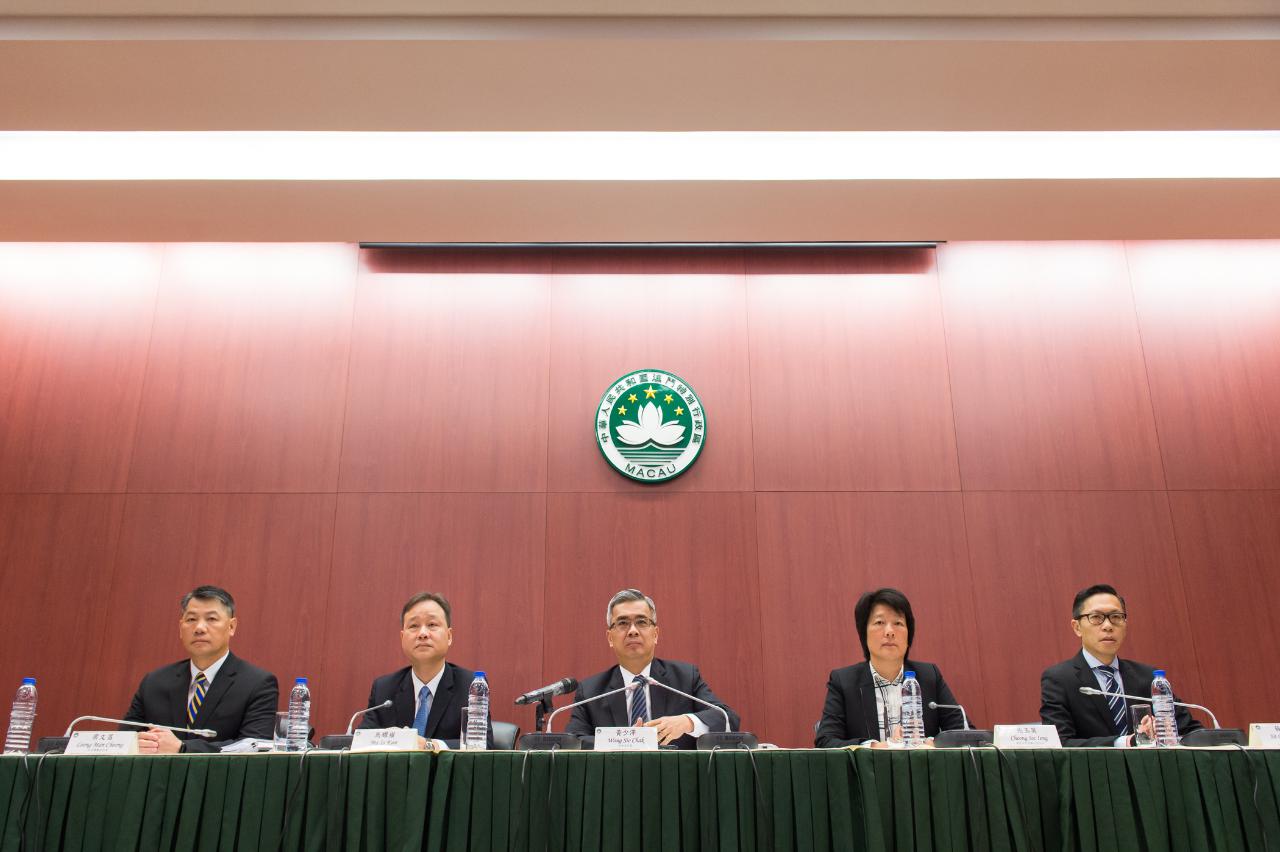 The Secretary for Security, Mr Wong Sio Chak, chairs a press conference on full-year 2018 crime figures and the police's enforcement statistics.
The Secretary for Security, Mr Wong Sio Chak, chairs a press conference on full-year 2018 crime figures and the police's enforcement statistics.
The full-year 2018 enforcement statistics from the police showed Macao to be a secure and safe city. Instances of the most serious forms of crime – kidnap, murder and grievous assault – continued to be either non-existent, or extremely rare.
Speaking at today’s media briefing about the full-year 2018 crime figures and about statistics regarding police enforcement activities, the Secretary for Security, Mr Wong Sio Chak, said the police would remain vigilant for signs of any upward trend in the number or types of crime, in order to maintain Macao’s safe environment.
The number of suspected crime cases reported in Macao in 2018 saw a 0.5 percent increase year-on-year, to 14,365 cases. Meanwhile, the number of violent crimes reported in the period fell by 21.1 percent from 2017, to 647 instances.
Across the 12 months of 2018, a total of 104 cases allegedly involving family violence was reported to the police. Following police investigations, only two from the aggregate number were categorised as domestic violence and were sent to the Public Prosecutions Office for further action. There were additionally two cases of murder, both suspected to be linked to family-related issues.
Mr Wong said it was notable that there were 27 cases of reported sexual abuse against children, representing a 50 percent year-on-year increase.
Burglaries reported in 2018 fell by 6.5 percent, to 2,747, representing 190 cases fewer than were recorded in 2017.
Regarding the reported number of scams, there were 1,195 cases in 2018, representing a rise of 31.3 percent from 910 cases registered a year earlier.
According to the Secretary, there were 1,633 cases involving the use of information retrieved from the electronic surveillance system set up across the city, since the system’s operation in September 2016. A total of 1,063 cases from the aggregate number involving information obtained via the system was recorded in 2018.
In the media briefing, Mr Wong said he noted an upward trend of more instances of crime involving people from outside Macao, and it posed serious challenges to the police’s enforcement.
Last year, the police had furthered their enforcement effort against illicit currency exchange. Some of such illicit activity had also been linked to other forms of crime such as robbery, scamming and fighting, added Mr Wong.
During 2018, the police had conducted a total of 913 operations and had sent out of Macao 3,050 people. Of those sent out of Macao last year, an aggregate of 2,269 was subject to a ban regarding re-entry to Macao.
The security authorities had not found evidence that the city’s gaming industry had had any negative influence on community security, said Mr Wong. The police were nonetheless paying close attention to developments in the sector and adjusting their enforcement strategies as necessary.
According to the Secretary, police investigations showed no arson cases recorded in 2018 had any correlation to any organised crime activities or to interests related to development of the gaming sector.
Mr Wong stressed the police had introduced in recent years some targeted initiatives in view of perceived types of gaming-related crimes, including enhanced real-time monitoring at casinos in order to enhance response to any emergencies; and had strengthened effort to prevent crimes occurring in the surroundings of casinos and hotels.
Regarding the authorities’ anti-smuggling arrangements in 2018, a total of 93 people-smugglers had been apprehended last year, a 31-percent year-on-year increase. The number of suspected illegal immigrants detained during 2018 totalled 814, a 23.3-percent year-on-year reduction.


